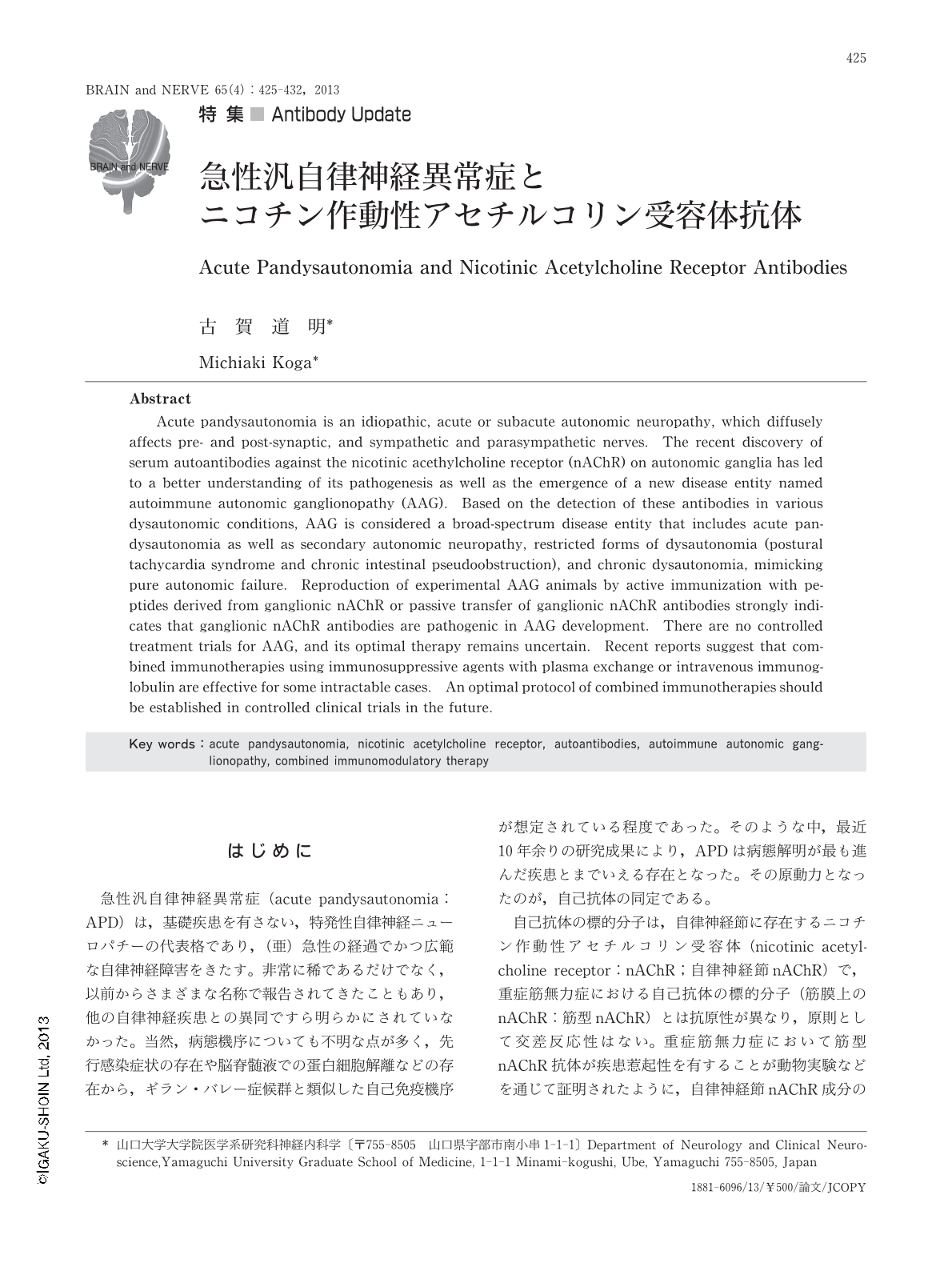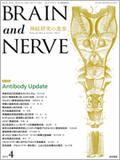Japanese
English
- 有料閲覧
- Abstract 文献概要
- 1ページ目 Look Inside
- 参考文献 Reference
はじめに
急性汎自律神経異常症(acute pandysautonomia:APD)は,基礎疾患を有さない,特発性自律神経ニューロパチーの代表格であり,(亜)急性の経過でかつ広範な自律神経障害をきたす。非常に稀であるだけでなく,以前からさまざまな名称で報告されてきたこともあり,他の自律神経疾患との異同ですら明らかにされていなかった。当然,病態機序についても不明な点が多く,先行感染症状の存在や脳脊髄液での蛋白細胞解離などの存在から,ギラン・バレー症候群と類似した自己免疫機序が想定されている程度であった。そのような中,最近10年余りの研究成果により,APDは病態解明が最も進んだ疾患とまでいえる存在となった。その原動力となったのが,自己抗体の同定である。
自己抗体の標的分子は,自律神経節に存在するニコチン作動性アセチルコリン受容体(nicotinic acetylcholine receptor:nAChR;自律神経節nAChR)で,重症筋無力症における自己抗体の標的分子(筋膜上のnAChR:筋型nAChR)とは抗原性が異なり,原則として交差反応性はない。重症筋無力症において筋型nAChR抗体が疾患惹起性を有することが動物実験などを通じて証明されたように,自律神経節nAChR成分の感作によりAPD類似の臨床所見を呈する動物モデルが作製され,また,患者血清IgGを実験動物へ受動免疫することで自律神経障害を再現できることまで示された。さらに,自律神経節nAChR抗体がAPDに限らずさまざまな病態で検出されることが見出され,「自己免疫性自律神経性ガングリオノパチー(autoimmune autonomic ganglionopathy:AAG)」という用語が汎用されるようになった。AAGは非常に広範な臨床スペクトラムを有する,従来なかった新しい疾患概念である。
本稿では,診断マーカーとして有用というだけでなく,エフェクター分子としての病態への関与まで証明され,自律神経疾患の枠組みを変えるきっかけとなった自律神経節nAChR抗体を中心に,自律神経ニューロパチーに関して概説する。
Abstract
Acute pandysautonomia is an idiopathic, acute or subacute autonomic neuropathy, which diffusely affects pre- and post-synaptic, and sympathetic and parasympathetic nerves. The recent discovery of serum autoantibodies against the nicotinic acethylcholine receptor (nAChR) on autonomic ganglia has led to a better understanding of its pathogenesis as well as the emergence of a new disease entity named autoimmune autonomic ganglionopathy (AAG). Based on the detection of these antibodies in various dysautonomic conditions, AAG is considered a broad-spectrum disease entity that includes acute pandysautonomia as well as secondary autonomic neuropathy, restricted forms of dysautonomia (postural tachycardia syndrome and chronic intestinal pseudoobstruction), and chronic dysautonomia, mimicking pure autonomic failure. Reproduction of experimental AAG animals by active immunization with peptides derived from ganglionic nAChR or passive transfer of ganglionic nAChR antibodies strongly indicates that ganglionic nAChR antibodies are pathogenic in AAG development. There are no controlled treatment trials for AAG, and its optimal therapy remains uncertain. Recent reports suggest that combined immunotherapies using immunosuppressive agents with plasma exchange or intravenous immunoglobulin are effective for some intractable cases. An optimal protocol of combined immunotherapies should be established in controlled clinical trials in the future.

Copyright © 2013, Igaku-Shoin Ltd. All rights reserved.


